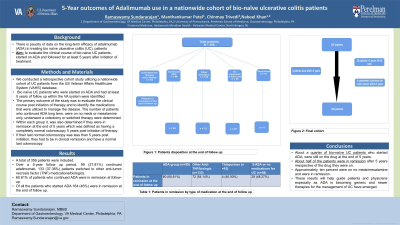Tuesday Poster Session
Category: IBD
P3628 - 5-Year Outcomes of Adalimumab Use in Nationwide Cohort of Bio-Naïve Ulcerative Colitis Patients
Tuesday, October 24, 2023
10:30 AM - 4:00 PM PT
Location: Exhibit Hall

Has Audio
- NK
Nabeel Khan, MD
Corporal Michael J. Crescenz VA Medical Center
Philadelphia, Pennsylvania
Presenting Author(s)
Ramaswamy Sundararajan, MBBS1, Manthankumar Patel, MBBS, MS1, Chinmay Trivedi, MD2, Nabeel Khan, MD1
1Corporal Michael J. Crescenz VA Medical Center, Philadelphia, PA; 2Hackensack Meridian Palisades Medical Center, North Bergen, NJ
Introduction: There is paucity of data on the long efficacy of adalimumab (ADA) in treating bio naïve ulcerative colitis (UC), patients. Our aim was to evaluate the clinical course of bio-naive UC patients, started on ADA and followed for at least 5 years after initiation of treatment.
Methods: We conducted a retrospective cohort study utilizing a nationwide cohort of UC patients from the US Veteran Affairs Healthcare System (VAHS) database. Bio naïve UC patients who were started on ADA and had at least 5 years of follow up within the VA system were identified. Patients’ records were individually evaluated. The primary outcome of the study was to evaluate the clinical course post initiation of therapy and to identify the medications that were utilized to manage the disease. The number of patients who continued ADA long term, were on no meds or mesalamine only, underwent a colectomy or switched therapy were determined. Within each group it, was also determined if they were in remission at the end of 5 years which was defined as having a completely normal colonoscopy 5 years post initiation of therapy or if their last normal colonoscopy was less than 5 years post initiation, they had to be in clinical remission and have a normal last colonoscopy.
Results: A total of 356 patients were included. Over a 5-year follow up period, 99 (27.81%) continued adalimumab. 133 (37.36%) patients switched to other anti-tumor necrosis factor (TNF) medications/biologics. 58 (16.29%) patients were either on mesalamine or no medications for UC. 10 (2.81%) patients were on thiopurines at the end of follow-up. 54 (15.17%) patients underwent colectomy for disease exacerbation and 2 (0.56%) for colon cancer. 60.61% of patients who continued ADA were in remission at follow-up and the breakdown of the other groups is shown in Table 1. Of all the patients who started ADA 164 (46%) were in remission at the end of follow up.
Discussion: About a quarter of bio-naïve UC patients who started ADA were still on the drug at the end of 5 years. About half the patients were in remission after 5 years, irrespective of the drug they were on. Approximately ten percent were on no meds/mesalamine and were in remission. These results will help guide patients and physicians especially as ADA is becoming generic and newer therapies for the management of UC have emerged.
Disclosures:
Ramaswamy Sundararajan, MBBS1, Manthankumar Patel, MBBS, MS1, Chinmay Trivedi, MD2, Nabeel Khan, MD1. P3628 - 5-Year Outcomes of Adalimumab Use in Nationwide Cohort of Bio-Naïve Ulcerative Colitis Patients, ACG 2023 Annual Scientific Meeting Abstracts. Vancouver, BC, Canada: American College of Gastroenterology.
1Corporal Michael J. Crescenz VA Medical Center, Philadelphia, PA; 2Hackensack Meridian Palisades Medical Center, North Bergen, NJ
Introduction: There is paucity of data on the long efficacy of adalimumab (ADA) in treating bio naïve ulcerative colitis (UC), patients. Our aim was to evaluate the clinical course of bio-naive UC patients, started on ADA and followed for at least 5 years after initiation of treatment.
Methods: We conducted a retrospective cohort study utilizing a nationwide cohort of UC patients from the US Veteran Affairs Healthcare System (VAHS) database. Bio naïve UC patients who were started on ADA and had at least 5 years of follow up within the VA system were identified. Patients’ records were individually evaluated. The primary outcome of the study was to evaluate the clinical course post initiation of therapy and to identify the medications that were utilized to manage the disease. The number of patients who continued ADA long term, were on no meds or mesalamine only, underwent a colectomy or switched therapy were determined. Within each group it, was also determined if they were in remission at the end of 5 years which was defined as having a completely normal colonoscopy 5 years post initiation of therapy or if their last normal colonoscopy was less than 5 years post initiation, they had to be in clinical remission and have a normal last colonoscopy.
Results: A total of 356 patients were included. Over a 5-year follow up period, 99 (27.81%) continued adalimumab. 133 (37.36%) patients switched to other anti-tumor necrosis factor (TNF) medications/biologics. 58 (16.29%) patients were either on mesalamine or no medications for UC. 10 (2.81%) patients were on thiopurines at the end of follow-up. 54 (15.17%) patients underwent colectomy for disease exacerbation and 2 (0.56%) for colon cancer. 60.61% of patients who continued ADA were in remission at follow-up and the breakdown of the other groups is shown in Table 1. Of all the patients who started ADA 164 (46%) were in remission at the end of follow up.
Discussion: About a quarter of bio-naïve UC patients who started ADA were still on the drug at the end of 5 years. About half the patients were in remission after 5 years, irrespective of the drug they were on. Approximately ten percent were on no meds/mesalamine and were in remission. These results will help guide patients and physicians especially as ADA is becoming generic and newer therapies for the management of UC have emerged.
Disclosures:
Ramaswamy Sundararajan indicated no relevant financial relationships.
Manthankumar Patel indicated no relevant financial relationships.
Chinmay Trivedi indicated no relevant financial relationships.
Nabeel Khan indicated no relevant financial relationships.
Ramaswamy Sundararajan, MBBS1, Manthankumar Patel, MBBS, MS1, Chinmay Trivedi, MD2, Nabeel Khan, MD1. P3628 - 5-Year Outcomes of Adalimumab Use in Nationwide Cohort of Bio-Naïve Ulcerative Colitis Patients, ACG 2023 Annual Scientific Meeting Abstracts. Vancouver, BC, Canada: American College of Gastroenterology.
